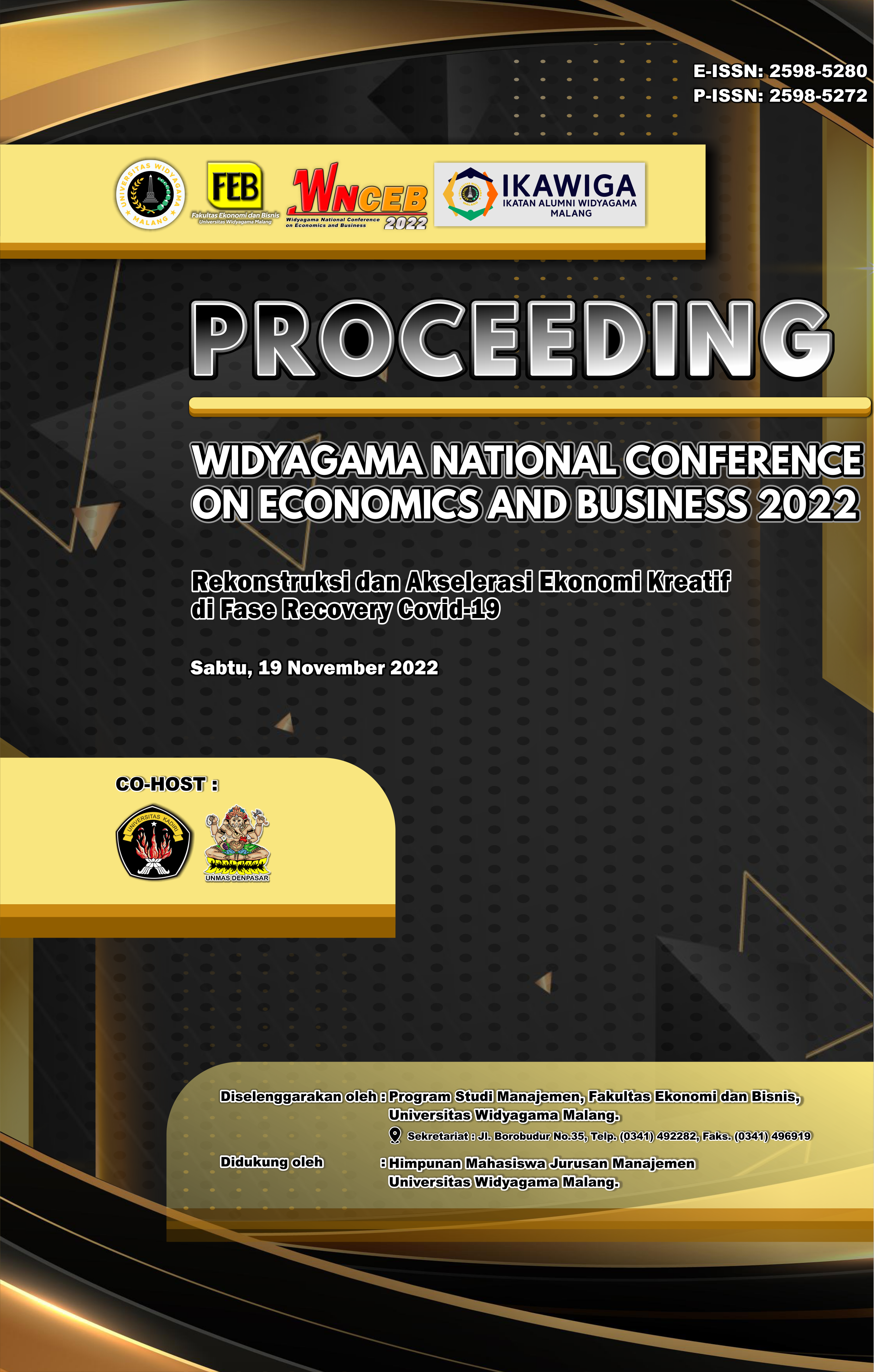Pengaruh Kompetensi Terhadap Kinerja Pelayanan, Dan Peran Hardiness Sebagai Variabel Moderasi (Studi Pada Pegawai Klinik Rawat Jalan Rampal Denkesyah 05.04.03)
DOI:
https://doi.org/10.31328/wnceb.v3i1.4164Abstract
AbstrakPenelitian ini dilaksanakan guna mengetahui kinerja pelayanan dan peran hardliness pada pegawai klinik rawat jalan Rampal Denkesyah 05.04.03, dan mengambil obyek berupa Kompetensi (X), Hardliness (M), Kinerja Pelayanan (Y). Peneliti juga telah menetapkan subyek penelitian, yaitu Pegawai Klinik Rawat Jalan Rampal Denkesyah 05.0 4.03. Teknik penarikan sample memanfaatkan metode Non Probability Sampling dengan memberikan kesempatan yang sama pada setiap anggota populasi. Klasifikasi sample pada penelitian ini diantaranya tenaga medis 6 responden, tenaga paramedis 14 responden, apoteker 3 responden, staf administrasi 10 responden, hingga jika diakumulasikan menjadi 33 responden. Jenis data yang telah dikumpulkan beruba data primer dan sekunder, dimana keduanya memiliki kinerjanya tersendiri, seperti pada data primer yang pada pengola han data dari wawancara, observasi, dan lain lain. Sementara data sekunder memuat data dari penelitian terdahulu. Penyebaran kuisionair dan dokumentasi pada karyawan Rampal Denkesyah 05.04.03 telah peneliti laksanakan dengan harapan mendapatkan data yang memiliki akurasi tinggi. Hasil yang telah didapatkan pada penelitian kali ini berupa 1) kompetensi memiliki pengaruh yang positif terhadap kinerja pelayanan. 2) Hardiness dapat memperkuat pengaruh kompetensi pada kinerja pelayanan.Kata Kunci: Kompetensi, kinerja pelayanan, hardliness AbstractThis research was conducted to determine service performance and the role of hardliness in outpatient clinic employees Rampal Denkesyah 05.04.03, and take the object of Competence (X), Hardliness (M), Service Performance (Y). Researchers have also determined research subjects, namely Outpatient Clinic Staff Rampal Denkesyah 05.04.03. The sampling technique utilizes the Non Probability Sampling method by providing equal opportunities for each member of the population. Classification of the sample in this study include 6 respondents medical personnel, 14 respondents paramedic staff, pharmacists 3 respondents, administrative staff 10 respondents, so that if accumulated to 33 respondents. The types of data that have been collected are primary and secondary data, both of which have their own performance, such as primary data processing data from interviews, observations, and others. While secondary data contains data from previous studies. The researcher has carri ed out the distribution of questionnaires and documentation to employees of Rampal Denkesyah 05.04.03 in the hope of obtaining high - accuracy data. The results obtained in this study are 1) competence has a positive influence on service performance. 2) Hardiness can strengthen the influence of competence on service performance.Keywords: Competence, service performance, hardlinessReferences
Akbar, A., Al Musadieq, M., &Mukzam, M.D. (2017). Pengaruh Komitmen Organisasional terhadap Kinerja (Studi pada Karyawan PT. Pelindo Surabaya). Jurnal Administrasi Bisnis (JAB), 47(2): 33-38.
Allen, N.J., & Meyer, J.P. (1990). The Measurement and Antecendents of Affective, Continuance and Normative Commitment to The Organization. Journal of Occupational Psychology, 63: 1-18.
Anindita, P.T. (2016). Pengaruh Iklim Etika terhadap Komitmen Organisasi dan Iklim Inovasi pada Karyawan PT. Rimbakencana Buminusa. Skripsi. Jurusan Manajemen Fakultas Ekonomi dan Bisnis Universitas Trisaksi Jakarta.
Arikunto, S. (2016). Prosedur Penelitian: Suatu Pendekatan Praktik. Jakarta: Rineka Cipta. Baron & Greenberg. (1997). Behavior in Organization Understanding and Managing The Human
Side of Work. 6thedition. USA: Prentice Hall.
Bernardin, H.J., & Russell, J.E.A. (2013). Human Resource Management. 6th Edition. New York: McGraw-Hill.
Bertens, K. (2007). Etika. Jakarta: Gramedia Pustaka Utama.
Biggs, D.A., & Blocher, H. (1986). The Cognitive Approach to Ethical Counseling: Values in Counseling Ethic. New York: State University of New York at Albany.
Bullock, M., & Panicker, S. (2003). Ethics for All: Differences Across Scientific Society Codes.
Science and Engineering Ethics, 9: 159-170.
Byars, L.L., & Rue, L.W. (2006). Human Resource Management. 8th Edition. New York: McGraw-Hill.
Gelade, G.A., Dobson, P., & Gilbert, P. (2006). National Differences In Organizational Commitment: Effect of Economy, Product of Personality, or Consequence of Culture? Journal of Cross-Cultural Psychology, 37 (5): 542-556.
Ghozali, Imam. (2014). Structural Equation Modeling, Metode Alternatif dengan Partial Least Square (PLS). Edisi 4. Semarang: Badan Penerbit Universitas Diponegoro.
Guerci, M., Radaelli, G., Siletti, E., Cirella, S., & Rami Shani, A. B. (2015). The Impact of Human Resource Management Practices and Corporate Sustainability on Organizational Ethical Climates: An Employee Perspective. Journal of Business Ethics. https://doi.org/10.1007/s10551-013-1946-1
Hadi, S. (2013). Metodologi Research. Jilid 3. Yogyakarta: Andi.

